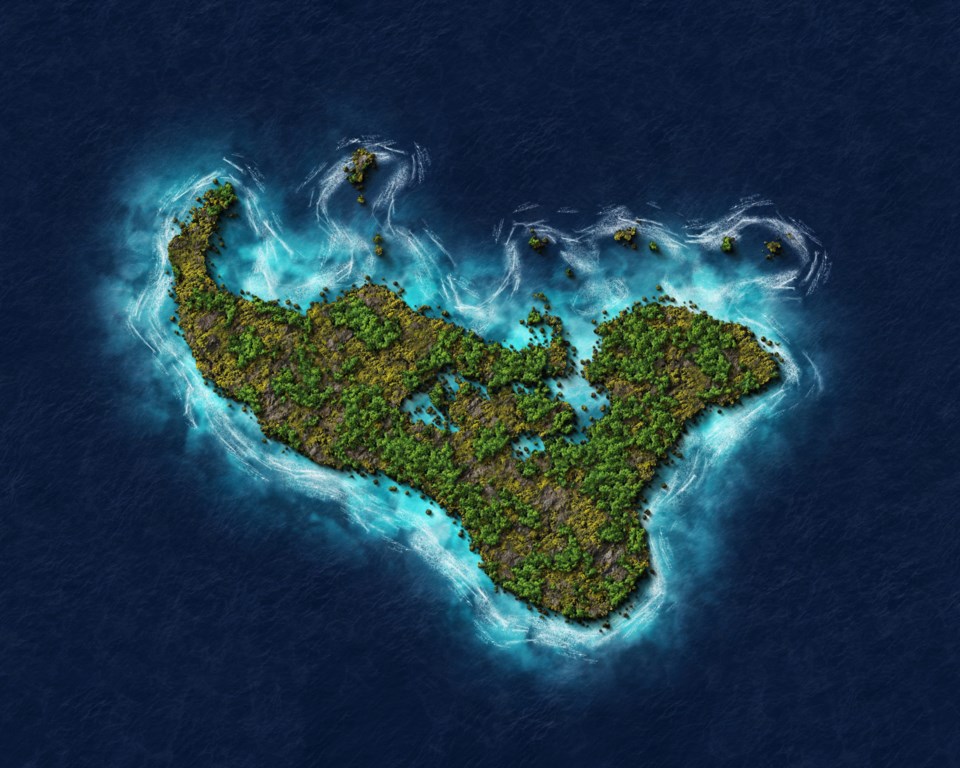Tonga is still assessing the devastation of January’s volcanic explosion that was .
The eruption caused a tsunami that hit Tonga and outlying islands, and spurred tsunami warnings in North America. It was a reminder that the South Pacific is not as distant from us as we might think.
Emergency relief aid is , though it’s been complicated by a few days later as well as restrictions that seek to keep the country free of COVID-19.
The larger challenge will be reconstruction once the attention of the world has moved on. : “It’s going to be a long road to recovery.”
During Canada’s ongoing , it’s important to remember there are lessons from a similar natural disaster 40 years ago in the South Pacific. That’s when Canadians helped rebuild after cyclone Isaac, the . Emergency relief arrived throughout 1982, but people in hard-hit outlying islands were still suffering a year later.
Development and kitchens
One desperate need was for cooking houses. Traditional societies in outlying islands use three types of structures — dwelling houses, cooking houses and bathing houses. While international agencies helped to rebuild homes, there was poor understanding of the need for cooking houses, known as peito ().
Enter a new Canadian organization: the (known at the time by its previous name, the South Pacific People’s Foundation). Its director, , an American-born veteran turned Canadian peace activist, communicated with village women’s groups in the more remote islands of Tonga and shared the need for cooking houses.
A year after the cyclone, Esmonde wrote in an internal document contained in the organization’s unpublished archives:
“Many peitos now consist of nothing more than a fire pit under a tree or a few pieces of leftover roofing iron.”
Village women emphasized the need for cooking houses to store and prepare food, to eat and to allow women to gather and carry out traditional functions and work, such as weaving.
In other words, peitos were not just about reconstructing villages. They were about reconstructing village life and about women’s needs — aspects not normally prioritized by international humanitarian agencies.
Focus on gender, Indigenous needs
In response, the launched the Tonga Kitchens project as its first full-scale development effort. It focused on issues of gender and Indigenous needs, not imported models.
Equally important, it paid close attention to the more remote northern islands — including many of the same islands by January’s tsunami, , where every house was destroyed following the eruption.
Delving into the unearths stories about close ties between Canada and the Pacific islands. The organization was founded in 1975 as an offshoot of the United States-based Foundation for the South Pacific, the brainchild of Australian actor and her husband, American studio executive Maurice (Red) Silverstein.
The Canadian organization increased its impact through grants from the British Columbia government. Under NDP Premier Dave Barrett, 小蓝视频 created an innovative fund to match aid money raised by 小蓝视频-based non-governmental organizations.
Matching fundraising dollars
The Canadian International Development Agency (CIDA) was at the time also willing to match fundraising as part of its emphasis on both in Canada and overseas.
CIDA funding for development education within Canada allowed the Pacific People’s Partnership to , who strengthened the organization’s existing ties with local women’s development groups in Tonga in the early 1980s.
She was part of the Tonga Kitchens project, in which the Pacific People’s Partnership sent $40,000 (more than $100,000 in today’s money) to help rebuild hundreds of peitos. Islanders did all the work, contributing 80 per cent of the project’s value. As the organization’s archives say: “The project was truly theirs.”
CIDA’s emphasis at the time on integrating women in development made the Pacific People’s Partnership’s work with Tongan women attractive in Ottawa. The partnership has retained that emphasis, with Tonga’s now a major partner.
The crisis centre stresses the Indigenous Tongan method of talanoa (talking informally) to provide mental health and other services. Its founder is feminist researcher , a leading thinker in building .
Aid now less effective
The Canadian government, however, later abandoned its earlier emphasis on civil society, women in development, development education and on the highly effective matching grants collaboration with Canadian civil society organizations.
It substituted corporate-driven and bureaucratic strategies such as or — shifts that have often made Canadian aid .
Only in recent years has Ottawa rediscovered ideas like “” and a “.”
That’s a positive development, but we also need to and craft effective strategies on civil society and feminist aid as the does. The Tonga Kitchens project shows the needs have remained constant over the decades, including after the latest eruption.
We should also learn from the sustained engagement of groups like the Pacific Peoples’ Partnership rather than rely on short-term contracts and project-based approaches. Canada’s government seems to create a new aid strategy every few years, then celebrates it. Instead, it should reckon honestly with its past and current aid record.
A further lesson is that initiatives should be informed by the affected community. Tongans know their needs better than foreign visitors. Aid needs to be reframed as solidarity, not as benevolence. In other words, Canada needs to .
Finally, when disasters strike, Canadians need to remember that reconstruction takes years. To be effective, it should focus on the expressed needs of local people, especially voices that can become marginalized — those of remote Indigenous peoples and village-based women.
Work such as the Tonga Kitchens project not only delivers concrete help, it also “strengthens and solidifies the efforts of grass roots women’s groups, and affirms their organization,” as one archival Pacific People’s Partnership report noted.
![]()
David Webster receives funding from the Social Sciences and Humanities Research Council. He is a fellow of the Canadian Foreign Policy Institute and a member of the Canadian Network on Humanitarian History.




